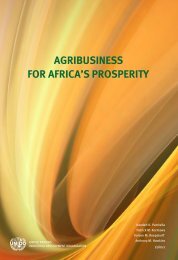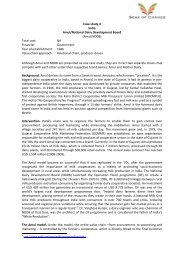Collection of Case Studies 2. - Seas of Change Initiative
Collection of Case Studies 2. - Seas of Change Initiative
Collection of Case Studies 2. - Seas of Change Initiative
Create successful ePaper yourself
Turn your PDF publications into a flip-book with our unique Google optimized e-Paper software.
FAO: FAO provided the initial US$50,000 and invited SNV to develop innovative ways <strong>of</strong> re-establishing ruralinput value chains. They went on to support the up-scaling through providing US$75,000 for the first phase<strong>of</strong> agro-dealer business training.HELP (Germany): A partner providing vouchers for the most vulnerable households through selectedwholesalers participating in RARP II and the agro-dealers. In addition, HELP provided the insurance for theprogramme <strong>of</strong> around US$100,000.SNV: SNV led the implementation <strong>of</strong> the programme and the co-ordination between various partners.Already at the beginning <strong>of</strong> the pilot programme, SNV facilitated dialogue with wholesalers and manufacturers inidentifying the challenges and perceived opportunities if they were to supply rural agro-dealers with storagestock. Various risks were identified, notably fire, fidelity, money and recall. Corresponding risk mitigationstrategies were explored with various wholesalers and insurers. SNV consolidated the views and developedgeneric concepts for both insurance and wholesaling. Partners included: Ten agro-input wholesalers 12 operated agro-dealer networks with 708 registered and insured agrodealersand two insurance companies provided the insurance. DANIDA is the main donor partnerproviding an initial contribution <strong>of</strong> US$1.2 million for capacity building for a three year period 13 . Capacitybuilding <strong>of</strong> wholesalers by SNV starts with helping each wholesaler develop a pr<strong>of</strong>itable agro-dealermodel through developing proposals. This capacity building extends to reviewing and installing moreviable systems. 14 Agro-dealers also receive technical training to equip them with the extension information required toproperly store agro-inputs and advise farmers on the correct use <strong>of</strong> agro-inputs. Farmers receive basic business management training covering issues such as contract management,group formation, leadership selection, enterprise budgeting etc. US$4.2 million was mobilised to set up a revolving fund targeting input and output value chains in ruralagriculture. SNV has since established the Zimbabwe Agricultural Development Trust (ZADT) to managethe revolving fund on a commercial basis, in partnership with commercial banks The objective <strong>of</strong> theFund is to make credit available to intermediaries in the agricultural and food value chains to enable ruralagro-dealers to stock inputs, small holder farmers to produce and rural marketing agents to purchasefarm outputs for the overall benefit <strong>of</strong> farmers. The target intermediaries include wholesalers, agrodealers,contracting companies, food processors, traders and value adding SMEs in the chains. FAO provided funding for capacity building – FAO plays a co-ordinating role in agro-inputs in Zimbabweand will provide funds for preparation and early stage capacity building German NGO HELP 15 , is running a free and subsidised voucher programme alongside the RARPprogramme targeting the poorest households. These households each receive a voucher worth US$60and it is expected that they will add to it so that they are able to purchase adequate inputs. On average,a household requires inputs with a value <strong>of</strong> US$400 to plant one hectare <strong>of</strong> land. HELP also provided thebulk <strong>of</strong> the insurance. Wholesalers were invited to tender to implement these voucher programmes andwere requested to utilise rural agro-dealers as distribution points. The vouchers were meant to assist themost vulnerable households, whilst at the same time acting as a catalyst to revive the rural shops, ascash was injected to the rural economy leading to more sales by the rural shops. Before, NGOs used todistribute seed/input packages to the vulnerable households, who also had no say on the composition <strong>of</strong>the packages.In total, in RARP II wholesalers were provided with insurance covering US$5,000 worth <strong>of</strong> inputs per shop. Intotal, US$112,000 worth <strong>of</strong> insurance was provided (paid by the German NGO HELP), which mobilised salesworth US$9.3 million (a leverage factor <strong>of</strong> 85 times).RARP II has evolved quite fast and is now developing other components that acknowledge that rural farmers haveneeds beyond agro-inputs. It has therefore been renamed as the Rural Agriculture Revitalisation Programme(RARP III). RARP III will test the hypothesis that supporting intermediaries benefits farmers. RARP III’s objective willbe to improve incomes for farmers by improving the functioning <strong>of</strong> rural input and output value chains.12Wholesalers are distributors who stock various types <strong>of</strong> agro-inputs for sale to retailers13These amounts differ from the amounts mentioned above, as these are for the total <strong>of</strong> the three years.14Some examples <strong>of</strong> the modules for wholesalers include: Strategy development, viability <strong>of</strong> distribution networks, accountingsystems, trade terms with suppliers, and preparation <strong>of</strong> business plans to access finance. For agro-dealers, training in retail businessmanagement covers the following: relationship management, working capital management, record keeping, marketing and sales,costing & pricing, shrinkage management, store lay out and warehousing and merchandising.15HELP and FAO are both funded by the European Commission.34







